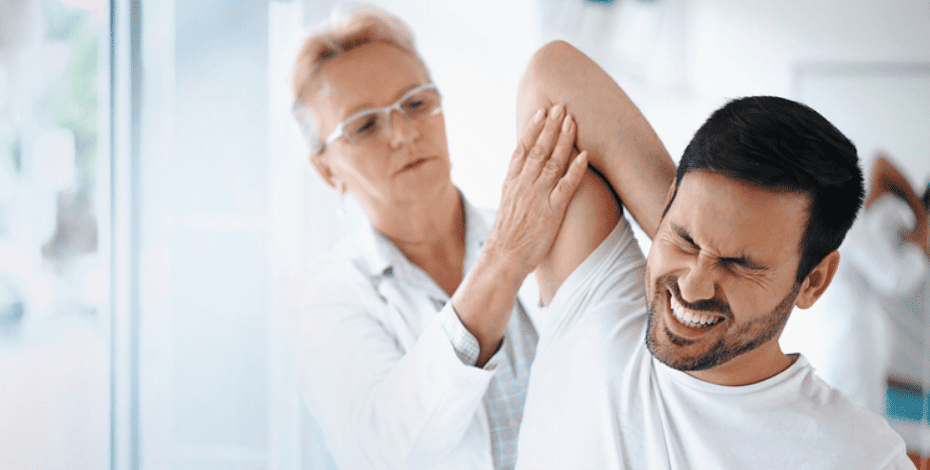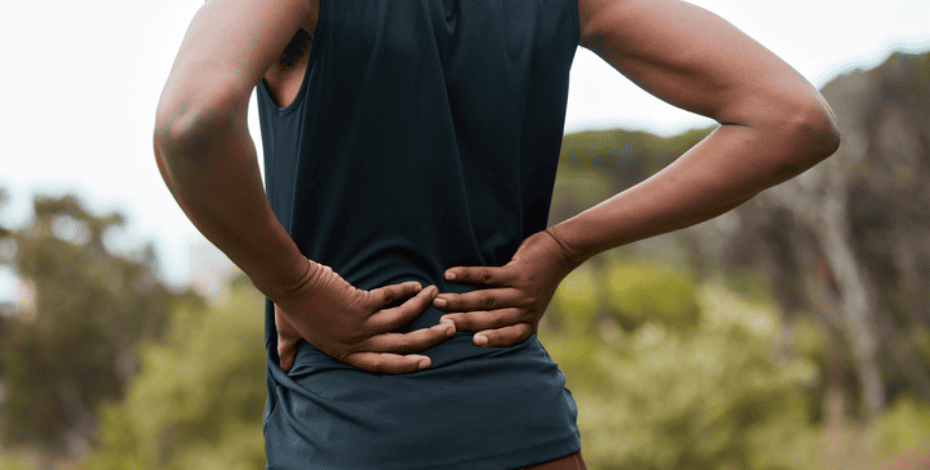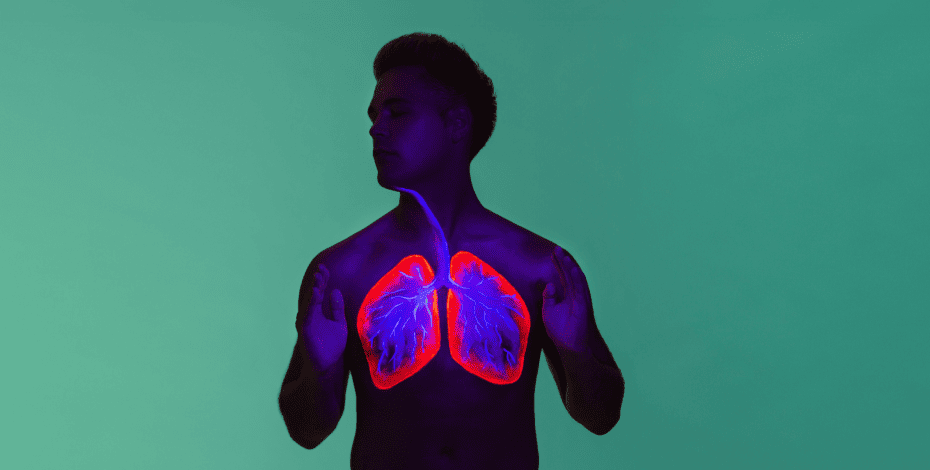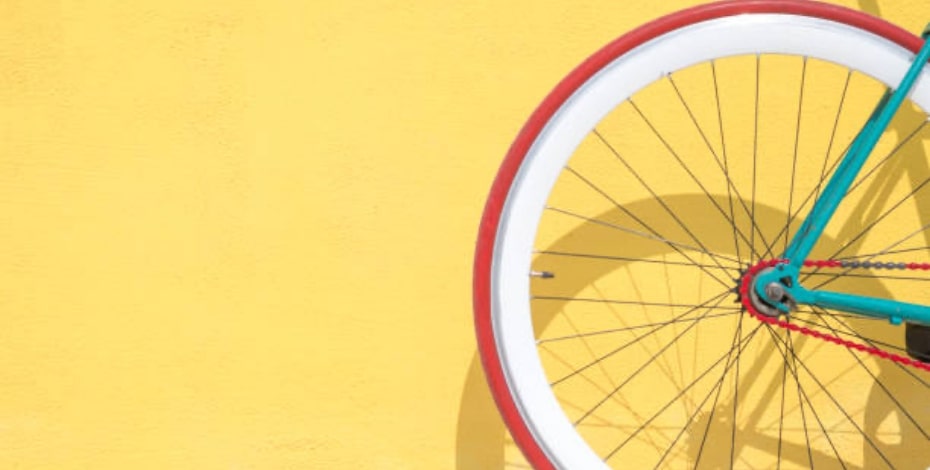
I want to ride a bicycle

An innovative physiotherapist-led group program, supported by the Physiotherapy Research Foundation, has shown great success in teaching children with cerebral palsy how to ride a bike. We speak to Dr Rachel Toovey about developing programs to help these children reach their goals.
Learning to ride a bicycle is a rite of childhood, but for children with cerebral palsy it can be a major achievement.
A recently published study led by University of Melbourne physiotherapy researcher Dr Rachel Toovey demonstrates that a group-based intensive training program led by physiotherapists is more effective at teaching these children to ride than being taught at home by parents.
The PRF-supported project, which formed the basis of Rachel’s PhD, involved a randomised clinical trial comparing outcomes for ambulant children with cerebral palsy who were taught to ride a bike through a physiotherapist-led, task-specific, group-based training program with outcomes for similar children who were taught in a non-specific, parent-led program.
Her research built on earlier work showing that many children with cerebral palsy were keen to learn to ride a bike, but for one reason or another had not had the opportunity to learn or didn’t get to learn until they were quite a bit older.
‘There was quite a big gap for those children who were able to walk but had cerebral palsy.
'While they had goals to ride two-wheel bikes, there were many children who were not able to or hadn’t had the opportunity to learn.
'Or if they had, they learnt quite a bit later,’ Rachel says.
Half of the 62 children in the trial were randomly allocated to the group-learning program and half were taught at home by their parents, who were provided with some generic information on bike riding and safety and received a call from a physiotherapist to see how they were going.
The group programs were conducted over a week during school holiday periods, with children and parents attending three two-hour-long group lessons and completing exercises at home.
The group program was led by a physiotherapist who coached not only the children, but also their parents, helping them to understand the movements and motor skills required.
The children were taught bicycle riding in a progressive, skills-based program focused on helping each child reach individually set goals.
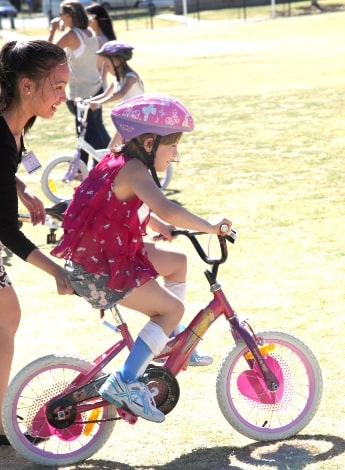
Children with cerebral palsy learn to ride bikes in a physiotherapist-led group program.
‘The main outcome or the mark of success for us was looking at whether the children achieved their goals related to bike riding.
'Those goals ranged from being able to learn to ride for the first time—say, riding 100 metres or 200 metres within that week—to participation and family-based things, like going on a bike ride with their families, being able to participate in bike education programs at school or going on school camp and doing the bike riding component, a combination of skill-focused goals and participation-related goals.’
Each child picked up to three goals, which had to include at least one skill-based goal, and the assessments, which were carried out before, immediately after and three months after completing the program, also included a look at participation in bike riding and physical activity, self-perception, carryover to other functional skills and quality of life.
The outcomes clearly showed that participation in the task-specific, physiotherapist-led program was superior to the parent-led program, with more goal attainment.
Immediately after the completion of the group program, the children participating had 10 times greater odds of achieving their goals.
Even three months later, they had four times greater odds than the children whose parents taught them.
The children who took part in the group program also had greater self-perceived competency, says Rachel.
‘They felt better about riding a bike, and thought they were better at riding a bike, after the program.
'They were also more involved in bike riding with their family three months later.’
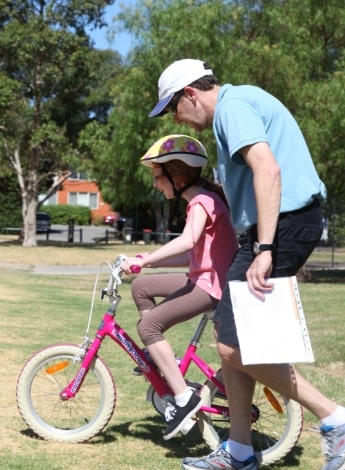
The group-led program created a supportive and participatory environment.
Rachel says that while it was clear some children could successfully learn to ride a bike at home, the group-led program provided children with a very supportive and participatory environment.
‘They’re participating with other kids who have similar disabilities and similar challenges in terms of learning to ride a bike.
'These are complex skills for these kids and so having that group mentality and everyone working towards their own individual goals but supporting each other seems really beneficial.’
Rachel says that interest in the program, which continues to run through the Victorian Paediatric Rehabilitation Service, has been phenomenal, with many physiotherapists contacting her for information about the study and setting up their own programs.
She says therapy for children with cerebral palsy and other disabilities is becoming more and more related to family goals, meaningful participation and physical activity.
‘Therapists and clinicians can use this research to develop programs they run or they might even draw out aspects of the program to apply to their own practice,’ she says.
While some larger practices may implement their own group programs, Rachel says the program can be easily adapted for one-on-one use, providing both intensive sessions in the clinic and home exercises to do with the assistance of the parents.
The program is also adaptable for use in teaching bike skills and other challenging movement skills to children and adults with disabilities, including autism and Down syndrome as well as acquired disabilities, Rachel says.
‘I’m really interested in—and I think physios have a big role in this—supporting inclusive physical activity participation.
'We’ve got very good expert knowledge of movement and physical activity and it’s how we work with clients who might not have had the same opportunities to participate in sport or other activities in the past.
'We can support those clients, and the patients we work with, to participate,’ Rachel explains.
Currently she is the Victorian lead researcher for an National Health and Medical Research Council-funded study that is investigating a combined, adapted cycling and walking training program for children with more significant movement challenges associated with cerebral palsy, such as the need to use a walker or a wheelchair.
Rachel says the PRF grant, which was awarded to support the bike study in 2016, has opened doors to other funding opportunities to further her research programs.
‘Since then, I’ve been able to leverage this grant and create relationships with other organisations, including Cycling Victoria and Bicycle Network, and we received a VicHealth grant supporting that work as well as a grant through Sport and Recreation Victoria,’ she says.
Rachel has also started the Inclusive Cycling Alliance group and a project called CycLink, aiming to bridge the gap between learning to ride a bike and participating in bike-riding activities with family members and in the community.
Working with physiotherapists and occupational therapists as well as community organisations including Cycling Victoria and Bicycle Network, they are co-designing programs to encourage community participation.
‘Just because a child will learn a skill like bike riding, it doesn’t mean they will then apply it and continue to participate.
'So it’s kind of like the next step, supporting kids to be able to continue to be physically active through cycling,’ she says.
In addition, Rachel has co-led the creation of CHAIN (Cycling through Health coaching, Adaptation, Inclusion and Networks), providing practitioners and coaches with the knowledge and skills to provide evidence-informed cycling interventions for children and young people with disability.
‘I think it’s a great activity for kids—for anyone, really—because not only can you do it with your family, on your own, with friends, you can also get to places on your bike,’ she says.
Click here for an infographic poster version of this article.
- Reference
Toovey et al (2021). Task-specific training for bicycle-riding goals in ambulant children with cerebral palsy: a randomized controlled trial. Developmental Medicine and Child Neurology, doi.org/10.1111/dmcn.15029
© Copyright 2024 by Australian Physiotherapy Association. All rights reserved.



